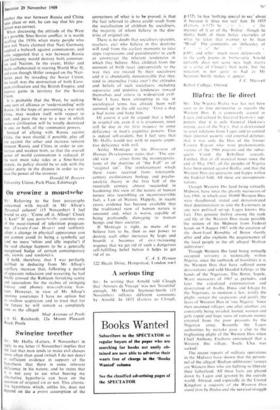Swinging together
Sir: Mr Hollis (Letters, 8 November) in reply to my letter (I November) implies that the fact that man tends to make evil choices more often than good (which I do not deny) is sufficient evidence in support of the hypothesis that there is some inherent deficiency in his nature, and he states that It is not easy to see what bearing my alternative hypothesis can have on the question of original sin or not. This alterna- tive hypothesis which, unlike his, does not depend on the a priori assumption of the correctness of what is to be proved, is that the fact referred to above could result from the socialisation of children by socialisers, the majority of whom believe in the doc- trine of original sin.
There is no doubt that socialisers (parents,
teachers, etc) who believe in this doctrine will tend from the earliest moments to take steps (repressions and punishments) to curb or counteract the inherent tendencies in which they believe. Also, children from the moment of birth react appropriately to the way they are treated by their socialisers and it is abundantly demonstrable that they tend to internalise ('take over') the attitudes and beliefs of such socialisers. including repressive and punitive tendencies toward themselves and others la widespread evil) What I have been attempting to say in sociological terms has already been well summed up in the old saying: 'Give a dog a bad name and hang him:
Of course it can be argued that a belief
in original sin, even if it is erroneous, must still be due in the first instance to some deficiency in man's cognitive powers. This is indeed self-evident, but I feel sure that Mr Hollis would not wish to equate cogni- tive deficiency with evil.
Ashley Montagu in his Direction of Human Development states that : 'The age- old view . . . arises from the misinterpreta- tions of the doctrine of "the Fall" or of "original sin". The reinforcement which these views received from nineteenth- century evolutionary biology and psycho- analytic theory in the first half of the twentieth century almost succeeded in hardening this view of the nature of human nature into resembling an incontrovertible fact, a Law of Nature. Happily, in recent years, evidence has become available that the traditional view of human nature is unsound and, what is worse, capable of being profoundly damaging to human beings and their societies.'
If Montagu is right, as many of us believe him to be, then as our power to destroy each other increases by leaps and bounds it becomes of ever-increasing urgency that we get rid of such a dangerous self-fulfilling belief before it helps to get rid of us.
C. A. S. Hynam
122 Heath Drive, Hampstead, London Nw3










































 Previous page
Previous page